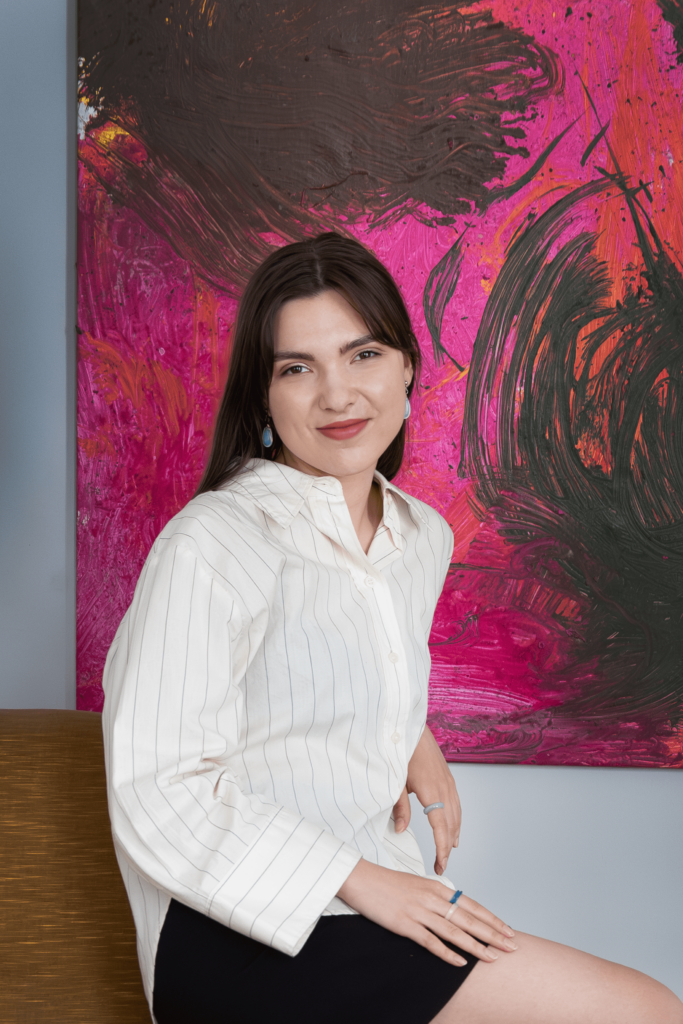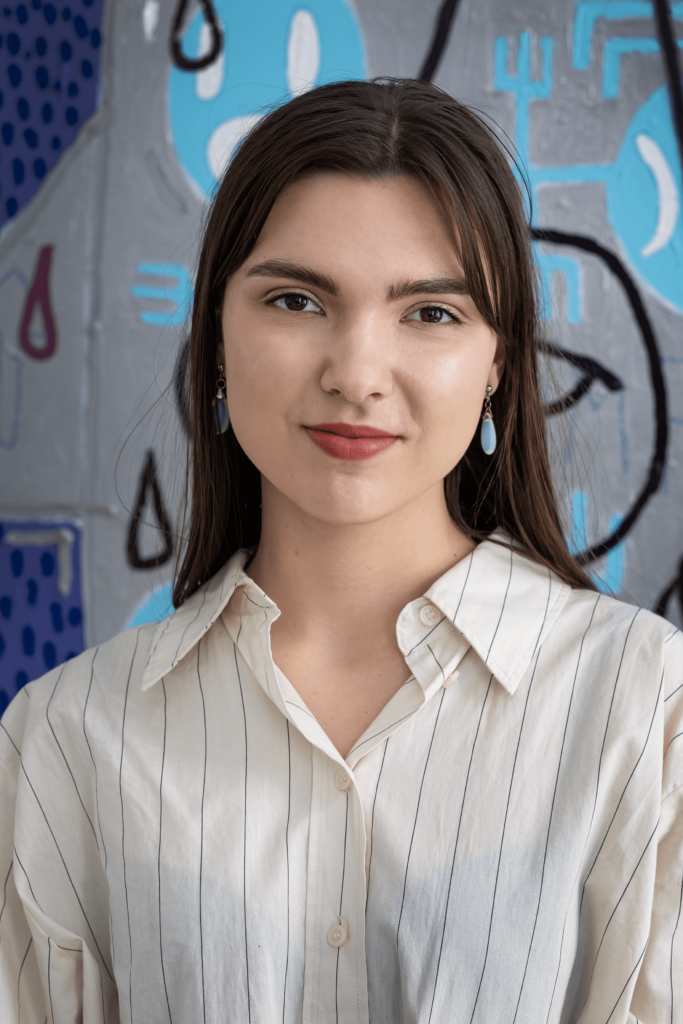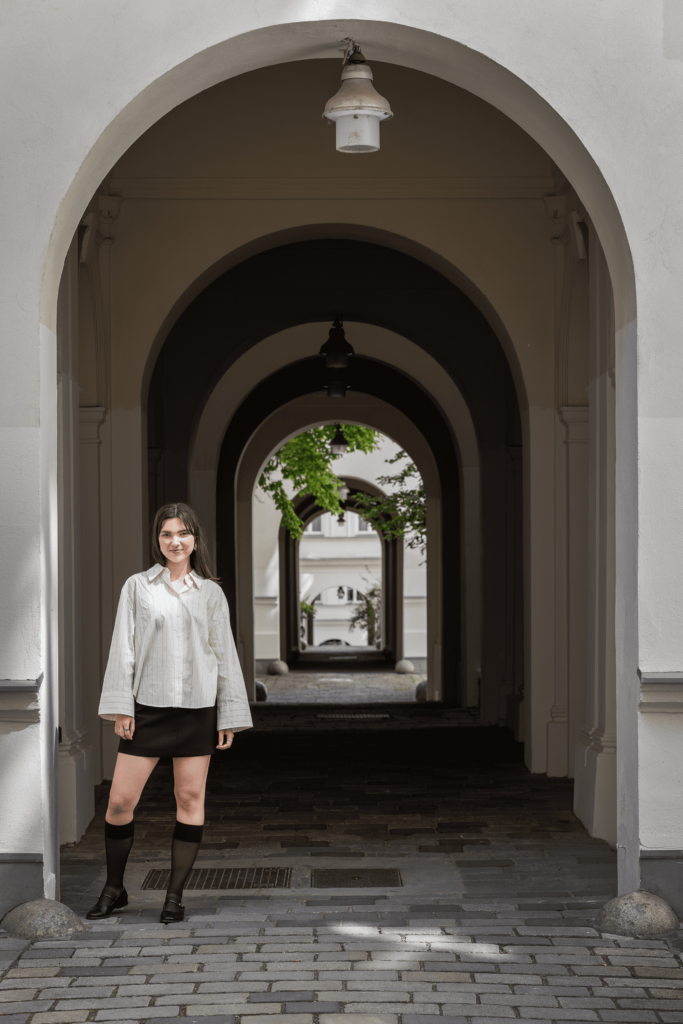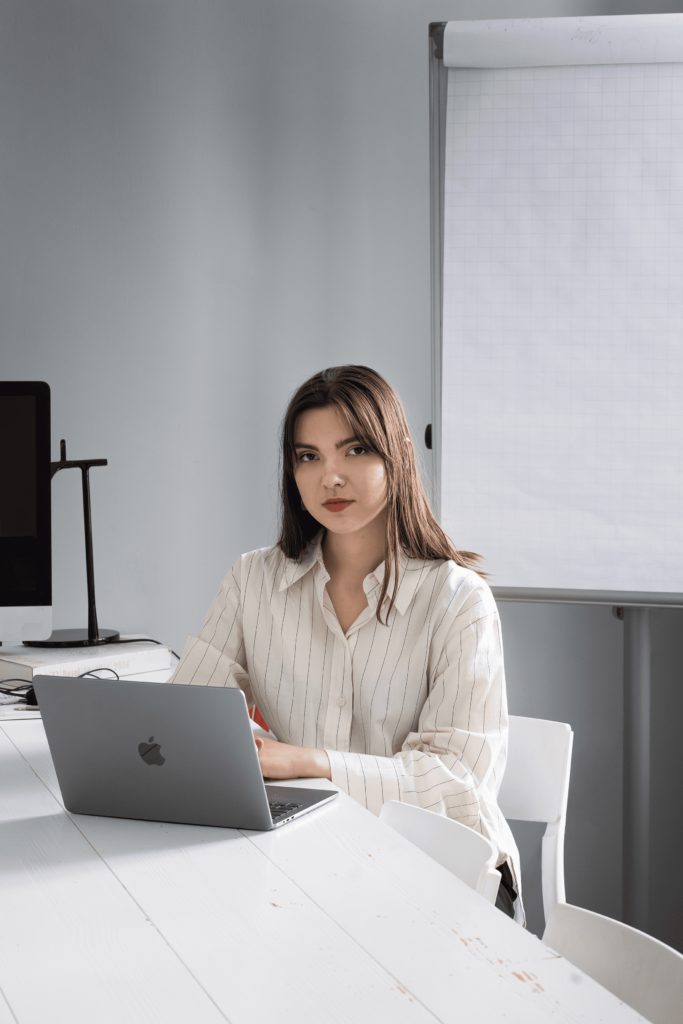
30 May 2024
Anastasiia Teslenko: “All of my expectations were met within the Professional Integration HUB program”
Anastasiia Teslenko, Participant of the Professional Integration HUB internship Program.
- Age: 24 years old
- City in Ukraine where you lived before the full-scale invasion (forced relocation): Kyiv
- Specialization: Social Sciences and Communications
PROFESSIONAL BACKGROUND
Before the full-scale invasion, I worked as a creative marketing manager at Welltech, a Ukrainian IT company that creates health and fitness apps.
In Ukraine, it is expected that you have professional work experience by the time you graduate from university. This contrasts with Central Europe, where young people often feel more secure and have the opportunity to explore different career paths and find their professional identity at a more relaxed pace. On one hand, Ukrainian professionals have an impressive CV by the age of 25, but on the other hand, it can be quite stressful due to the need to meet certain societal expectations and maintain a balance between work, life, and study.
FORCED EMIGRATION
I lived in Kyiv, studied psychology at Kyiv-Mohyla Academy, and worked remotely for Welltech. I remember feeling stressed because I had so much to do – I needed to pass the Meta Certified Digital Marketing Associate Exam for my job and study for university seminars. However, on February 24th, like every other Ukrainian, I woke up to the sound of explosions, and suddenly none of this seemed to matter anymore. I had to cancel the exam. I received an email from Kyiv-Mohyla Academy informing us that the academic process was paused indefinitely. Everything stood still, and nothing seemed to matter except for human life.

I moved to Austria unexpectedly. My partner was studying in Vienna at the time, and I had a visit planned. Ironically, I even had a plane ticket for February 26. I never used it. Our reality had drastically changed, and from then on, the only planes flying over Ukraine were the ones dropping russian bombs on us. I was supposed to get to Vienna from Boryspil airport in two hours, but instead, it took two days. I remember hesitating whether I should stay in Kyiv or not.
After one week of the full-scale russian invasion, my friend called me and said that she was going to wait in Warsaw until things got safer. She asked me if I wanted to join her on this “trip.” So, we took an evacuation train to Lviv, then another train to Poland, which stopped in the middle of a field because Ukrainian passenger trains use wider rails than European ones. We could only follow the route for cargo trains. After that, there was a five-hour car trip to Warsaw and finally a train to Vienna. I reached my destination on March 5, which I remember very well. At that time, I truly hoped that the war wouldn’t last long, and that I would return to Kyiv in a month or two.
LIFE IN AUSTRIA
The primary challenge in Austria was the language barrier. I had never studied German or planned to move to a German-speaking country, so navigating the bureaucratic system without understanding the language was particularly difficult.
Not being able to speak German has certainly limited my work options. During my first year here, I pursued a Master’s degree at Central European University. Even though it is located in Vienna, it is a very multicultural university with English as the lingua franca. However, after graduating, I kept receiving job rejections and realized that speaking German is essential for professional development in Austria.

Living in Vienna is very convenient. The streets are safe, the transport system is amazing, and the city is well-equipped to meet the needs of different people. There are many beautiful buildings that are preserved and cherished, with constant renovations ensuring that no historical heritage falls into decay or gets replaced by new parking lots. On the downside, I still can’t get used to the fact that supermarkets don’t operate on Sundays, and the level of digitalization is quite low compared to Ukraine.
I’ll strongly recommend the Ukrainians living abroad to tell their international friends about Ukrainian culture, as they likely know very little about it. Teach them a few simple words, cook a traditional meal for them, or play a Ukrainian song. We have such an amazing heritage and every reason to be proud of it.
PROFESSIONAL INTEGRATION HUB
I came across the open call post the Professional Integration HUB program while scrolling through Instagram, and it immediately caught my attention.
I was thrilled to gain my first real job experience in Austria, to meet new people, and to explore deeper the artistic landscape of this country. I can confidently say that all of these expectations were met.
I am delighted to have been a part of the program. It was psychologically reassuring to realize that I wasn’t alone in navigating the challenge of applying professional experience in a new country. Over the course of three months, I had the opportunity to explore numerous exciting places and meet incredibly talented individuals.
One particularly memorable moment occurred during one of our early weekly team meetings at viennacontemporary. The entire office was buzzing with discussions ranging from galleries, artists, curators, and journalists to floor plans and catering arrangements. In that moment, I felt an overwhelming sense of happiness to be a part of such a dynamic environment. As someone who has always been passionate about art, being involved in the creation of a large-scale art-sharing event like viennacontemporary was incredibly inspiring.

Working can be fun, especially when tasks like attending gallery openings are part of the job description. More importantly, workplaces that prioritize employee well-being tend to achieve more successful outcomes. Additionally, I’ve come to understand the importance of networking. Building connections with individuals who are professionally or personally intriguing can lead to future collaborations, even if they seem unlikely at first.
The most valuable lesson I’ve learned from the internship is that personal fulfillment and success are closely tied to engaging in activities that you personally find meaningful.
PLANS AFTER PARTICIPATING IN THE PROGRAM
The internship provided clarity to my professional path. Despite having prior experience in communications and marketing at various organizations, I had never worked in the art and culture sector before this internship. Now, I am certain that I want to continue down this path.
We have many creative and talented individuals contributing to Ukraine’s cultural sphere despite challenging circumstances. While some Ukrainian artists are already renowned worldwide, others remain undiscovered by the general public. Our goal is to build bridges and connect Ukrainian cultural workers with their European counterparts. However, this also involves reminding our fellow Ukrainians about the great cultural works we already possess – the writers, poets, dramaturges, and painters who were either persecuted or appropriated by the russian imperialistic regime. It is imperative that we remember the forgotten ones and reclaim their legacies. I hope that one day Ukrainian museums will be as popular among foreign visitors as institutions like Albertina or Leopold Museum.
Series of Interviews with Participants of the Professional Integration HUB Program.